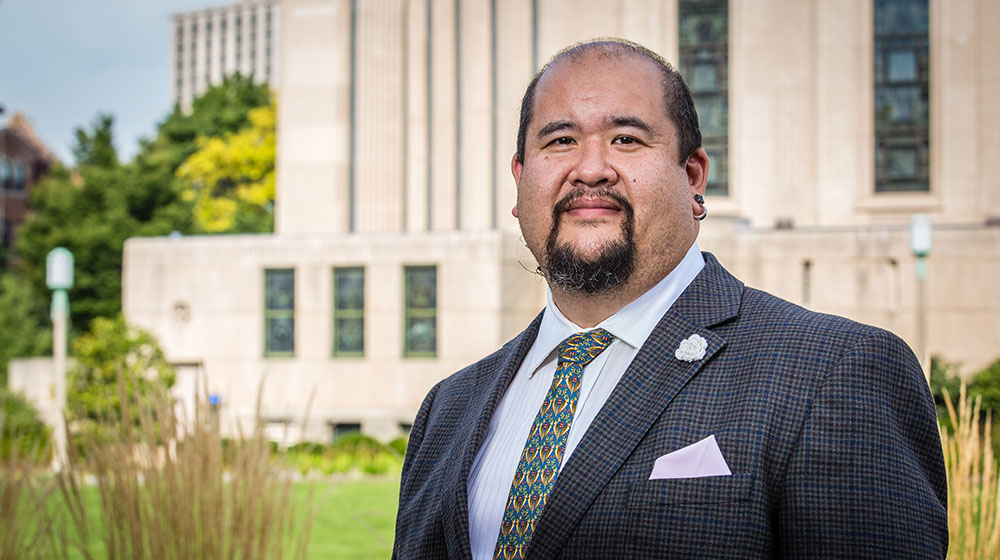archive
Redefining diversity

Associate professor David Embrick, this year’s Graduate Faculty Member of the Year, has a passion for researching and understanding issues of diversity within educational and corporate institutions. (Photo: Natalie Battaglia)
By Ana Plefka | Student reporter
“Never one to privilege his own interests above the collective good.”
That is how Kasey Henricks, a PhD candidate in sociology, described associate professor David Embrick when he nominated Embrick for Graduate Faculty Member of the Year.
Embrick, who has been teaching sociology at Loyola since 2006, was not even aware that he was nominated for the award. And he was even more surprised to have received it earlier this year because “there are so many great faculty at Loyola, many of whom deserve this award,” he said.
With a passion for researching and understanding issues of diversity within educational and corporate institutions, Embrick certainly dedicates himself to the collective good.
A diverse line of work
Embrick defines sociology simply as the use of science to understand human social behavior. His research, however, is anything but simple.
Lately, he has been exploring issues centered on one word: diversity.
“My earlier work looked at racial and gender diversity in corporate Fortune 500 companies,” Embrick said. “For the past four years, I have been giving talks across the nation, mostly to universities, about understanding diversity.”
According to Embrick, it is precisely institutions such as universities that need to take a closer look at the meaning of diversity.
“People associate diversity with a feel-good term that equates to equality,” Embrick said. “So there are these institutions that are lacking in ‘racial diversity,’ but they don’t really understand what that means.”
In order to make real changes regarding diversity issues within educational institutions and corporations, Embrick suggests a more critical understanding of the term itself in society. How should we go about dissecting diversity? Embrick is on a mission to find out.
Embrick investigates the ways in which diversity is being used to maintain the status quo, either intentionally or otherwise. His work at Loyola earned him a Sujack Master Researcher Award last year from the College of Arts and Sciences, an honor that goes to a researcher who advances the Jesuit ideal of higher education and the Loyola community as a whole.
“There is a personal as well as a societal importance in taking a firm look at diversity,” Embrick said.
A model professor, mentor
Embrick, who received his doctorate, master’s, and bachelor’s degrees from Texas A&M University, made the move from the Southwest to the Midwest in 2006. Two factors attracted him to Loyola: the University’s social justice mission, which coincides with Embrick’s research; and Loyola’s dedication to faculty research.
Loyola’s focus on social justice and experiential learning is not only complementary to Embrick’s work, but also to his teaching style.
“I think that in order to be a great teacher, you also have to be a great researcher,” Embrick said. “You need to do more than just regurgitate material to students and expect them to regurgitate it right back to you.”
This engaging teaching style is reflected in Embrick’s students. Henricks, the student who nominated Embrick for Graduate Faculty Member of the Year, speaks about the professor with respect and admiration.
“He represents a model of what an intellectual, teacher, and mentor should be,” Henricks said. “Dr. Embrick is someone who leads through action, setting an example for like-minded others of what kind of world we want to live in.”
As an experienced, published writer in the sociology world, Embrick offers networking and publication workshops to help graduate students become familiar with publishing and has even co-authored pieces with students.
Embrick, who is teaching Sociology 101: Society in a Global Age this semester, simply hopes that his students walk away from his class with a better understanding of the society in which they live.
“I want them to be aware that some concepts in society that we think are concrete are actually socially constructed topics,” Embrick said. “The way that we are socialized, the way that we communicate with one another—sociology is one of those things that affect our everyday lives.”


